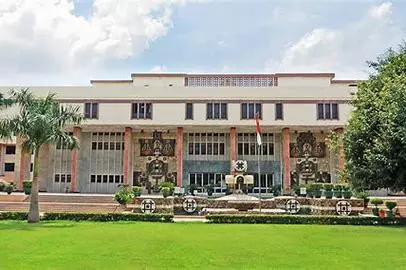Sealed Cover Procedure For Promotion Can Be Invoked Only After Charge-Sheet Or Suspension: Delhi HC
Namdev Singh
20 Sept 2025 12:34 PM IST

A Division bench of the Delhi High Court comprising Justice Navin Chawla and Justice Madhu Jain held that sealed cover procedure cannot be invoked merely on the basis of an FIR or investigation, it applies only after issuance of a charge-sheet, criminal prosecution, or suspension.
Background Facts
A Departmental Promotion Committee (DPC) was held on 18.03.2024 for considering eligible officers for regular promotion to the post of Joint Commissioner. The respondent's case was kept in a sealed cover by the authorities, despite his contention that such action was contrary to the law laid down in Union of India v. K.V. Jankiraman.
An FIR was registered by the CBI against the respondent on 11.05.2023. An ECIR was also registered by the Enforcement Directorate under Prevention of Money Laundering Act, 2002. The draft charge-sheets were prepared in 2022 and allegations of forged caste certificate and misconduct were pending investigation. However, the respondent pointed out that no charge-sheet in disciplinary proceedings or in criminal prosecution had been issued, nor was he under suspension. He relied on the Office Memorandums of 1992 and 2004, to submit that sealed cover procedure was impermissible in his case. Aggrieved, the respondent approached the Central Administrative Tribunal.
By order dated 17.12.2024, the Tribunal directed the authorities to open the sealed cover, grant respondent promotion w.e.f. 01.01.2021 if recommended by UPSC, and place his name appropriately in the seniority list dated 28.03.2024 of Joint Commissioners of Customs and Indirect Taxes.
Aggrieved by the same, the Union of India filed the writ petition.
It was submitted by the petitioners that an FIR had been registered by the CBI on 11.05.2023, and an ECIR had also been registered by the Enforcement Directorate under the Prevention of Money Laundering Act, 2002. It was further stated that draft charge-sheets for major penalty were prepared on 27.09.2022 and 27.12.2022. It was further submitted that complaints were also received regarding submission of a forged caste certificate by the respondent for securing employment. Further another complaint alleged that the respondent had sought confidential information relating to pending investigations. Both complaints were under investigation by the CBI.
The petitioners relied upon the judgments of Union of India v. Kewal Kumar and State of M.P. v. Syed Naseem Zahir, wherein the Supreme Court upheld the validity of sealed cover procedure in cases involving serious allegations and pending investigation before CBI. It was therefore argued that the exception carved out in K.V. Jankiraman v. Union of India was squarely applicable to the case, justifying the decision of the DPC to keep the respondent's case in a sealed cover.
On the other hand, it was submitted by the respondent that the sealed cover procedure could not have been applied in his case as the necessary pre-conditions were not fulfilled. It was stated that no charge-sheet in any disciplinary proceedings had been issued, nor had any charge-sheet in a criminal prosecution been filed against him. It was further submitted that the respondent had not been placed under suspension.
It was further submitted that the petitioners admitted that the issuance of charge memo was kept in abeyance due to the advice of the CVC. Hence, there was no pending disciplinary or criminal proceeding which could justify the invocation of sealed cover procedure. It was contended that w.r.t. FIR, the CBI had sought three months further time to complete the investigation. Therefore, the FIR was still at the stage of investigation and the stage of filing of the charge-sheet is far away, therefore the sealed cover procedure cannot be adopted.
Findings of the Court
It was observed by the Court that as on the date of the DPC, no departmental proceedings were pending against the respondent and no charge-sheet had been issued either in disciplinary proceedings or in a criminal prosecution. The respondent was also not placed under suspension. Therefore, the three limited conditions prescribed in the Office Memorandum dated 14.09.1992, issued pursuant to the judgment in K.V. Jankiraman v. Union of India, were not fulfilled.
It was held by the Court that mere pendency of an FIR or preliminary investigation cannot justify the application of the sealed cover procedure. The Court reiterated that the law laid down in K.V. Jankiraman makes it clear that sealed cover can be resorted to only after a charge-memo or criminal charge-sheet has been issued. If the allegations are serious, the authorities have the power to suspend the employee, and such suspension itself would permit the application of the sealed cover procedure.
It was further held that the reliance placed by the petitioners on cases of Kewal Kumar and Syed Naseem Zahir was misplaced, as in those cases charge-sheets had already been issued or disciplinary proceedings were concluded. However, in this case the petitioners themselves had admitted that the issuance of charge memo was kept in abeyance and the CVC had also concurred with the same, hence no proceedings were pending.
Therefore, the directions of the Tribunal to open the sealed cover were upheld by the court. Further it was directed by the court to grant promotion to the respondent.
With the aforesaid observations, the writ petition was dismissed.
Case Name : Union Of India And Ors vs Sameer Dnyandev Wankhede
Case No. : W.P.(C) 10271/2025 & CM APPL. 42676/2025
Counsel for the Petitioner : Ashish K. Dixit, CGSC with Shivam Tiwari, Umar Hashmi, Urmila Sharma, Advs.
Counsel for the Respondents : Sudhir Nandrajog and Arvind Nayar, Sr. Advocates
Click Here To Read/Download The Order


